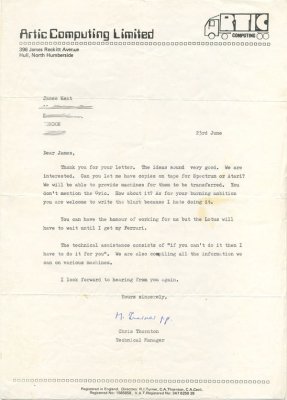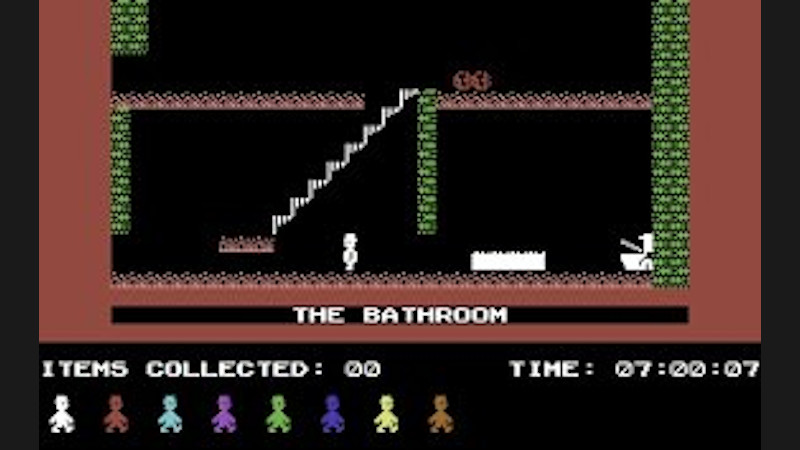If you are a follower of retrocomputing, perhaps you caught the interactive Black Mirror episode Bandersnatch when it came out on Netflix. Its portrayal of a young British bedroom coder finding his way into the home computer games industry of the early 1980s was of course fictional and dramatised, but for those interested in a real-life parallel without the protagonist succumbing to an obsession with supernatural book there’s a recent epic Twitter thread charting an industry veteran’s path into the business.

[Shahid Kamal Ahmad] now has an impressive portfolio spanning his his nearly four decades at the forefront of gaming, but his story starts in 1982 as a diabetic British Pakistani teenager from a not-privileged background in London writing in BASIC on his Atari 400. His BASIC games are good, but not good enough to gain acceptance from a publisher, so he sells his prized BMX bicycle to buy books on Atari 6502 assembler, a coffee percolator, and for curiosity’s sake, [Rodnay Zaks’] Programming the Z80. An obsessive three-month learning of 6502 programming and the Atari’s architecture ensues, and his game Storm in a Teacup sells to Artic Software. He’s a professional game developer.
We follow him through a couple more projects until he arrives at Software Projects in Liverpool to try to sell his game Faces of Haarne, which he secures publishing for but also lands the opportunity of a lifetime. Jet Set Willy is the smash hit of the year on the ZX Spectrum, and they urgently need a Commodore 64 port. Can he do it in four weeks, with a bonus if he manages three? The subsequent descent into high-pressure assembly coding and learning the quirks between two completely different 8-bit architectures is an epic in itself, but he manages it in just a shade over the three weeks and they pay him the bonus anyway. His career in the computer game industry is cemented.
Through this tale the reminders of 1980s Britain are everywhere, far from bring a retro paradise it was a place hollowed out by industrial decline, with very little for those at the bottom of society to be optimistic about. His descriptions of casual racism are hard-hitting, but the group of computer-addicted friends at school is probably something that all teenagers of the era whose interests lay in that direction can relate to. The real hero of the story is probably his mother, who somehow found the resources for that Atari 400 and who provided him with much-needed support and encouragement.
This thread captures a unique and never-to-be repeated era in which a teenager could master an emerging technology and make a living in it without an expensive education. Like Bil Herd’s description of his career at Commodore in the same period, it’s well worth a read.
















Wow.
“The real hero of the story is probably his mother, who somehow found the resources for that Atari 400 and who provided him with much-needed support and encouragement.”
Hallelujah to all the parents out there.
This really is true. My mom and dad basically had no idea what I was spending my money in the 70’s (that I earned as a busboy or part time warehouse worker); it was a lot of money for things that bleeped or lit up LED’s or put letters on a TV set. But it did keep me out of trouble, sort of.
Nice to see Chris T’s previous incarnation as ‘Technical Manager’ of Arctic, I worked with him for a couple of decades but haven’t seen him since Hull beer festival around 2015. If you are reading this, I hope you are keeping well Chris!
What a wonderful read.
It captures those days so clearly.
Falling asleep to dreams of JSW MM ATMC and snippets of 6502, Z80 and 6809 were definitely a thing for me.
Thanks you for the link to the story and massive props to Shahid for fighting and surviving. And that port of JSW of course.
Awesome. Brings the 80s flooding back.
Including mullets and big hair?
Non priveleged and owns a atari 400 in 1982. Sounds priveleged to me.
Read through the twitter thread and you’ll get that mistery solved.
Hint, he was not privileged.
Oh, they mean white privilege. Not money, or having a house, clothes etc… I used to get chased by pacific island gangs yelling honky, wore hand me down clothes, best I could get in a computer was a a Vic20 with no tape drive in 1987. The one place he sure wasn’t privileged was his health. It would be horrific for him and his whole family for being that sick, I really feel for him. When people say privileged I think they mean having living in broken down cars, and begging for food, scraping through garbage dumps etc…
“never-to-be repeated era in which a teenager could master an emerging technology and make a living in it without an expensive education”. I find that cringe-inducing, even grating. Firstly it’s patronizing, but also I don’t think it’s accurate on several counts. Firstly “an expensive education” is probably not a relevant factor; I suppose one could argue that Bill Gates himself was the “teenager in tech” with an expensive education, But excepting him, generally “expensive educations” are geared towards making money in traditional fields; not inventing things or creating tech, nor even entrepreneurship. Doctors, lawyers and Wall Street brokers have expensive educations, but the reasons for this seem to me self-evident.
The phrase also made me think of Wozniak, who was 26 when he did the Apple I, 20 for his version of the phreaking “blue box”. Yes that was well before ’82 and he technically wasn’t a teenager, but it begs the questions: why specify “teenager” and “emerging tech” and “making a living at it” at all? Those seem arbitrary categories. and I think it possible today that some engineering prodigy might do some FPGA programming on MiSTer to do the equivalent, (or in this case even EXACTLY the same thing!)
It also just seem dismissive of young people who try today. “Forget it kid, those days are gone. Now get me another latte.” I’ll be generous and assume the motives for verbalizing such sentiment are to encourage young people to do biotechnology, Cripsr genetics, or some other futuristic field that’s more promising than present-day fiddling with electrons in silicon. Or maybe it’s reverse-psychology and you’re daring kids to prove you wrong. Still, it sounds awfully cynical and old-mannish, dare I say, “Boomer”? There are just a thousand better ways to get nostalgic and still celebrate the achievements of Mr. Ahmad and B. Herd. Or maybe the reference “without the protagonist succumbing to an obsession with supernatural book” an elaborate warning against seeking the eldritch knowledge in the Necronomicon????
Any new field is easier to enter. The Wright Brothers, Marconi, early radio amateurs. There wasn’t yet a lot to learn, so entry was easy. There were no barriers either. You didn’t need qualifications, those came later, and little or no competition.
It was similar 45 years ago. A group of people learning and creating. There was as high demand, but in a small segment of society. You didn’t need glossy packaging, or expensive advertising. The magazines brought us news, but were also a place for that one man operation to sell their cassette software, tossed into a pkastic bag. There was a finite space between that one man operation, and the biggest small computer company.
Doing the indie way nowadays you need a big fat portion of luck, patience and a nice wad of cash to bridge a year or two of earning nothing.
Jet Set Willy, the game of my youth on my very first computer: an Amstrad CPC 464.
My first computer languages were Amstrad BASIC and Z80 assembly.
I followed this same route, but not as far. I sold a ZX81 game to a software publisher in 1982, and then sold them a couple more titles over the next few years. I think that my most successful game sold 20,000 copies, so the £375 I was paid for it might have been a good deal for the publisher.
But, eventually, I went away to University and found other ways to spend my time, and abandoned my nascent programming career.
I don’t especially regret this, as it happens. I only really coded for the fun of it, and still get to code for fun. But now it is unpaid for open source projects.
Nobody called is “bedroom programmers” then, though. We were “computer whiz-kids”. I have a newspaper clipping somewhere to prove it :-)
Just read it all, epic! I never got any further than getting a game published in Your Computer but it was still a big thing for me at the time!